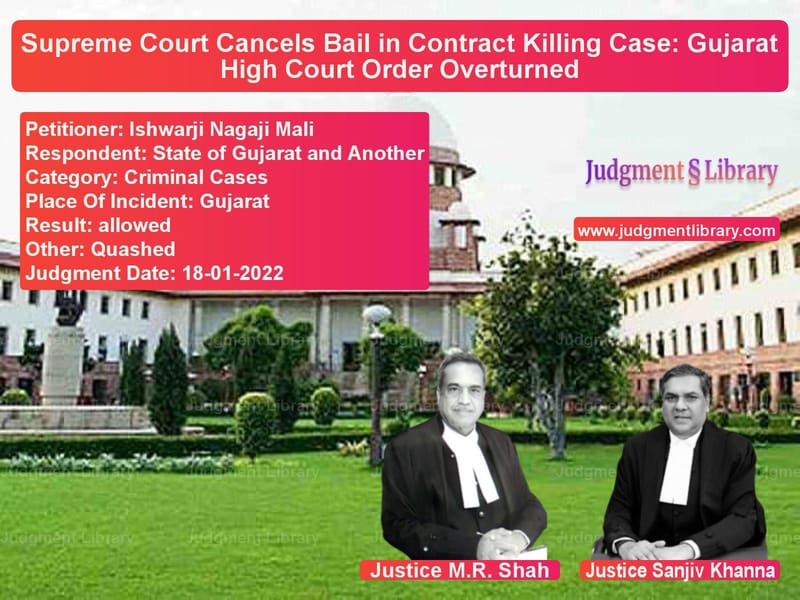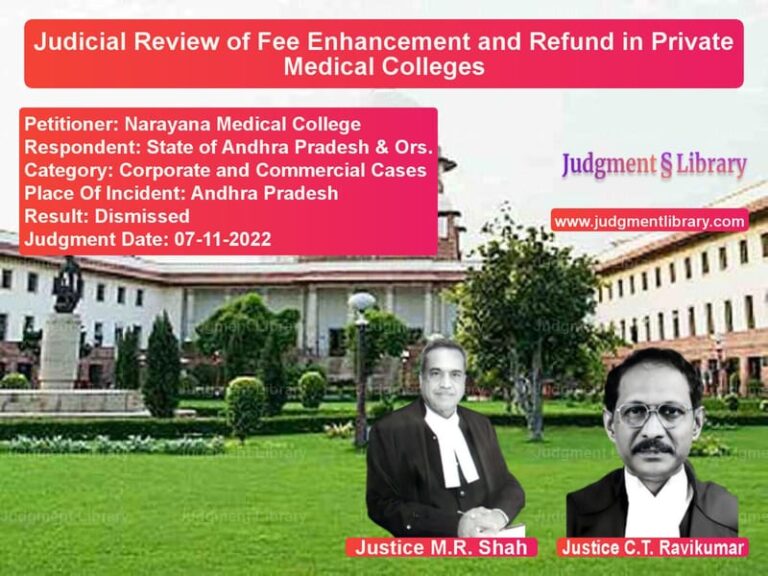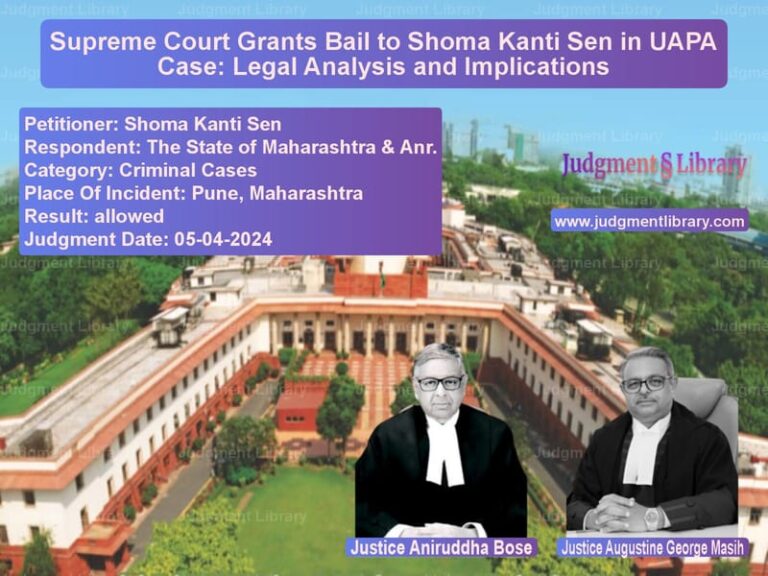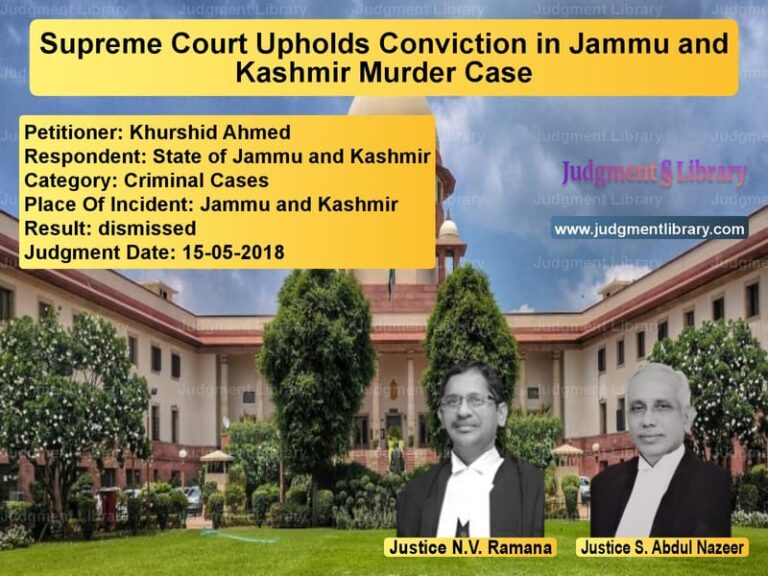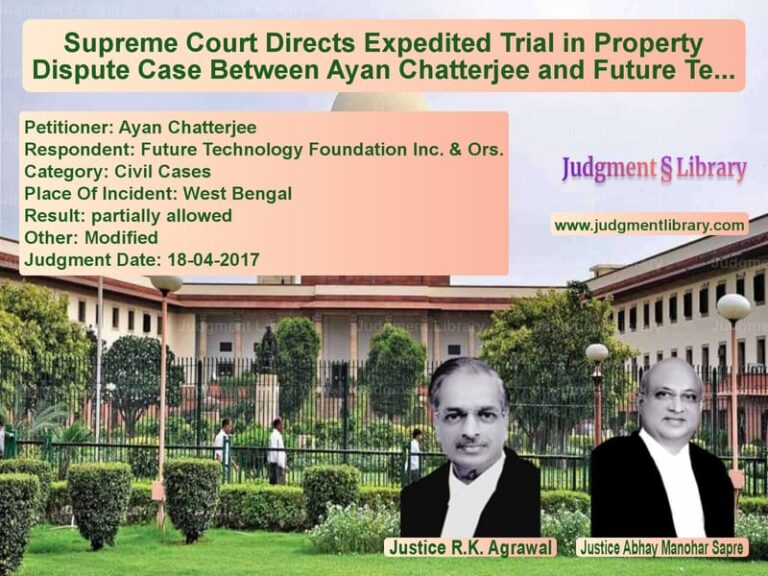Supreme Court Cancels Bail in Contract Killing Case: Gujarat High Court Order Overturned
The Supreme Court’s judgment in Ishwarji Nagaji Mali vs. State of Gujarat and Another is a crucial ruling concerning the grant of bail in cases involving serious criminal offenses. The Court quashed the Gujarat High Court’s order granting bail to the main accused, who allegedly orchestrated the murder of his wife as part of a criminal conspiracy. The decision underscores the importance of judicial prudence while granting bail in cases of heinous crimes, especially when compelling evidence exists against the accused.
Background of the Case
The case involved a brutal murder that was initially disguised as an accident. On the morning of December 26, 2020, the victim, Daxaben, was allegedly hit by a speeding white Swift Dzire car while walking with her husband, respondent no.2, near the Hanumanji Temple in Gela village. Initially, the incident was registered as an accident under Sections 304A of the IPC and Sections 177, 184, and 134 of the Motor Vehicles Act.
However, during the investigation, the police uncovered evidence suggesting that the incident was not an accident but a premeditated murder:
- The accused husband had taken out an accident insurance policy worth Rs. 60 lakh in the joint name of himself and his wife just three months before the incident.
- Phone call records revealed that the accused was in contact with the co-accused, including the driver of the Swift car, just minutes before the incident.
- Multiple witness statements and forensic findings pointed to a criminal conspiracy rather than a road accident.
Based on these findings, the investigating officer applied to add charges under Sections 302, 120(B), and 114 of the IPC, leading to the arrest of respondent no.2.
Legal Issues Raised
- Whether the High Court erred in granting bail despite overwhelming circumstantial evidence suggesting a pre-planned murder.
- Whether the seriousness of the crime and the potential for tampering with evidence justified continued custody.
- Whether the lower courts correctly applied the principles of bail jurisprudence.
Arguments of the Petitioner (Father of the Deceased)
The petitioner, the victim’s father, challenged the bail order, arguing:
- The High Court failed to consider crucial evidence establishing the accused’s involvement in the conspiracy.
- The accused had a strong financial motive, as he had taken a high-value insurance policy on his wife.
- The High Court wrongly assumed that cases based on circumstantial evidence are ‘weak’ and do not justify denying bail.
- The accused’s release posed a significant risk of witness tampering, given the influence he wielded.
Arguments of the Respondents (Accused and State)
The accused countered that:
- The prosecution’s case was based purely on circumstantial evidence.
- He had strong social roots, making it unlikely that he would abscond.
- Since the investigation was complete and the charge sheet had been filed, his continued detention was unnecessary.
Supreme Court’s Observations
The Supreme Court, comprising Justices M.R. Shah and Sanjiv Khanna, made the following critical observations:
1. Circumstantial Evidence Is Not a Weak Basis for Bail Denial
- The Court criticized the High Court’s reasoning that circumstantial evidence is a ‘weak’ basis for denying bail.
- The Court held that when a strong chain of circumstances is established, bail should not be granted lightly.
2. Lack of Consideration of Material Evidence
- The High Court failed to consider critical evidence, including phone records, insurance policies, and forensic findings.
- The Court held that bail should not be granted mechanically without assessing the gravity of the charges.
3. Judicial Precedents on Bail
The Court cited various precedents, including:
- Gudikanti Narasimhulu v. Public Prosecutor (1978): The nature of the charge and its gravity must be given due weight.
- Prahlad Singh Bhati v. NCT of Delhi (2001): The seriousness of the accusations and the likelihood of the accused fleeing or tampering with evidence must be considered.
- Ramesh Bhavan Rathod v. Vishanbhai Hirabhai Makwana (2021): Bail orders must contain sound reasoning and not be passed in a mechanical manner.
4. Risk of Witness Tampering
- The Court emphasized that the accused’s release could threaten witness testimony.
- The accused had financial resources that could be used to influence the trial.
Final Judgment
The Supreme Court quashed the Gujarat High Court’s order and directed the accused to surrender immediately. The judgment stated:
“The High Court’s order granting bail is hereby quashed and set aside. The accused shall surrender before the trial court within one week. The observations in this order are only for the purposes of bail and shall not affect the trial proceedings.”
Implications of the Judgment
This ruling reinforces several key legal principles:
- Stringent Scrutiny in Murder Conspiracy Cases: Courts must carefully assess evidence before granting bail in cases involving premeditated crimes.
- Judicial Responsibility in Bail Matters: High Courts must provide sound reasoning and not grant bail mechanically.
- Protection of Witnesses: The decision highlights the judiciary’s role in ensuring that witness testimony is not tampered with.
Conclusion
The Supreme Court’s decision in Ishwarji Nagaji Mali vs. State of Gujarat sets a vital precedent for bail jurisprudence in serious criminal cases. By overturning the Gujarat High Court’s order, the Court reaffirmed that the gravity of the offense, the potential for evidence tampering, and the presence of strong circumstantial evidence are critical factors in bail decisions. This ruling ensures that judicial discretion is exercised judiciously, balancing individual liberty with the interests of justice.
Read also: https://judgmentlibrary.com/supreme-court-commutes-death-sentence-in-child-rape-and-murder-case-2/
Petitioner Name: Ishwarji Nagaji Mali.Respondent Name: State of Gujarat and Another.Judgment By: Justice M.R. Shah, Justice Sanjiv Khanna.Place Of Incident: Gujarat.Judgment Date: 18-01-2022.
Don’t miss out on the full details! Download the complete judgment in PDF format below and gain valuable insights instantly!
Download Judgment: ishwarji-nagaji-mali-vs-state-of-gujarat-and-supreme-court-of-india-judgment-dated-18-01-2022.pdf
Directly Download Judgment: Directly download this Judgment
See all petitions in Bail and Anticipatory Bail
See all petitions in Attempt to Murder Cases
See all petitions in Custodial Deaths and Police Misconduct
See all petitions in Judgment by Mukeshkumar Rasikbhai Shah
See all petitions in Judgment by Sanjiv Khanna
See all petitions in allowed
See all petitions in Quashed
See all petitions in supreme court of India judgments January 2022
See all petitions in 2022 judgments
See all posts in Criminal Cases Category
See all allowed petitions in Criminal Cases Category
See all Dismissed petitions in Criminal Cases Category
See all partially allowed petitions in Criminal Cases Category

